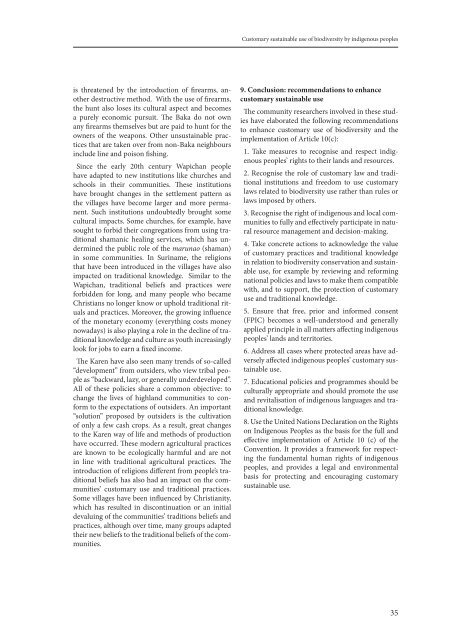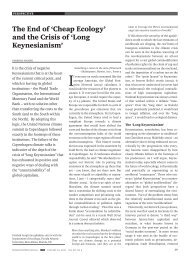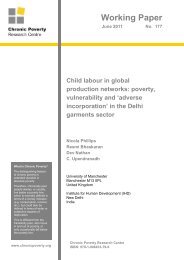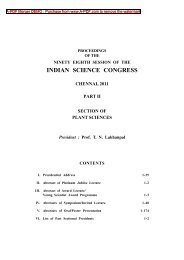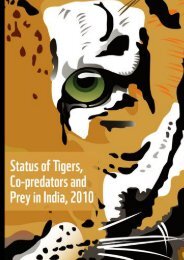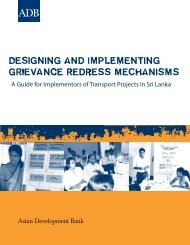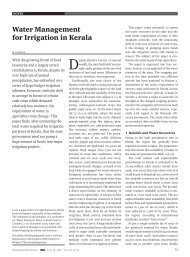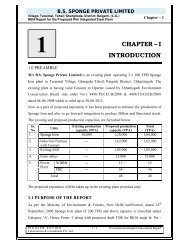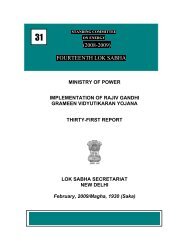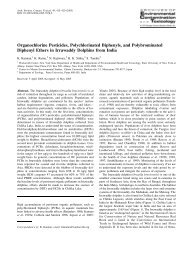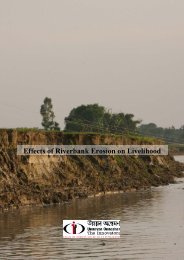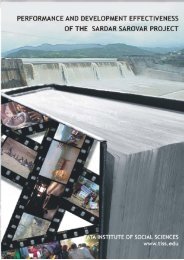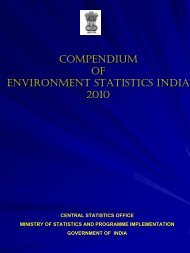sustainable use of biological diversity.pdf - India Environment Portal
sustainable use of biological diversity.pdf - India Environment Portal
sustainable use of biological diversity.pdf - India Environment Portal
Create successful ePaper yourself
Turn your PDF publications into a flip-book with our unique Google optimized e-Paper software.
Customary <strong>sustainable</strong> <strong>use</strong> <strong>of</strong> bio<strong>diversity</strong> by indigenous peoples<br />
is threatened by the introduction <strong>of</strong> firearms, another<br />
destructive method. With the <strong>use</strong> <strong>of</strong> firearms,<br />
the hunt also loses its cultural aspect and becomes<br />
a purely economic pursuit. The Baka do not own<br />
any firearms themselves but are paid to hunt for the<br />
owners <strong>of</strong> the weapons. Other un<strong>sustainable</strong> practices<br />
that are taken over from non-Baka neighbours<br />
include line and poison fishing.<br />
Since the early 20th century Wapichan people<br />
have adapted to new institutions like churches and<br />
schools in their communities. These institutions<br />
have brought changes in the settlement pattern as<br />
the villages have become larger and more permanent.<br />
Such institutions undoubtedly brought some<br />
cultural impacts. Some churches, for example, have<br />
sought to forbid their congregations from using traditional<br />
shamanic healing services, which has undermined<br />
the public role <strong>of</strong> the marunao (shaman)<br />
in some communities. In Suriname, the religions<br />
that have been introduced in the villages have also<br />
impacted on traditional knowledge. Similar to the<br />
Wapichan, traditional beliefs and practices were<br />
forbidden for long, and many people who became<br />
Christians no longer know or uphold traditional rituals<br />
and practices. Moreover, the growing influence<br />
<strong>of</strong> the monetary economy (everything costs money<br />
nowadays) is also playing a role in the decline <strong>of</strong> traditional<br />
knowledge and culture as youth increasingly<br />
look for jobs to earn a fixed income.<br />
The Karen have also seen many trends <strong>of</strong> so-called<br />
“development” from outsiders, who view tribal people<br />
as “backward, lazy, or generally underdeveloped”.<br />
All <strong>of</strong> these policies share a common objective: to<br />
change the lives <strong>of</strong> highland communities to conform<br />
to the expectations <strong>of</strong> outsiders. An important<br />
“solution” proposed by outsiders is the cultivation<br />
<strong>of</strong> only a few cash crops. As a result, great changes<br />
to the Karen way <strong>of</strong> life and methods <strong>of</strong> production<br />
have occurred. These modern agricultural practices<br />
are known to be ecologically harmful and are not<br />
in line with traditional agricultural practices. The<br />
introduction <strong>of</strong> religions different from people’s traditional<br />
beliefs has also had an impact on the communities’<br />
customary <strong>use</strong> and traditional practices.<br />
Some villages have been influenced by Christianity,<br />
which has resulted in discontinuation or an initial<br />
devaluing <strong>of</strong> the communities’ traditions beliefs and<br />
practices, although over time, many groups adapted<br />
their new beliefs to the traditional beliefs <strong>of</strong> the communities.<br />
9. conclusion: recommendations to enhance<br />
customary <strong>sustainable</strong> <strong>use</strong><br />
The community researchers involved in these studies<br />
have elaborated the following recommendations<br />
to enhance customary <strong>use</strong> <strong>of</strong> bio<strong>diversity</strong> and the<br />
implementation <strong>of</strong> Article 10(c):<br />
1. Take measures to recognise and respect indigenous<br />
peoples’ rights to their lands and resources.<br />
2. Recognise the role <strong>of</strong> customary law and traditional<br />
institutions and freedom to <strong>use</strong> customary<br />
laws related to bio<strong>diversity</strong> <strong>use</strong> rather than rules or<br />
laws imposed by others.<br />
3. Recognise the right <strong>of</strong> indigenous and local communities<br />
to fully and effectively participate in natural<br />
resource management and decision-making.<br />
4. Take concrete actions to acknowledge the value<br />
<strong>of</strong> customary practices and traditional knowledge<br />
in relation to bio<strong>diversity</strong> conservation and <strong>sustainable</strong><br />
<strong>use</strong>, for example by reviewing and reforming<br />
national policies and laws to make them compatible<br />
with, and to support, the protection <strong>of</strong> customary<br />
<strong>use</strong> and traditional knowledge.<br />
5. Ensure that free, prior and informed consent<br />
(FPIC) becomes a well-understood and generally<br />
applied principle in all matters affecting indigenous<br />
peoples’ lands and territories.<br />
6. Address all cases where protected areas have adversely<br />
affected indigenous peoples’ customary <strong>sustainable</strong><br />
<strong>use</strong>.<br />
7. Educational policies and programmes should be<br />
culturally appropriate and should promote the <strong>use</strong><br />
and revitalisation <strong>of</strong> indigenous languages and traditional<br />
knowledge.<br />
8. Use the United Nations Declaration on the Rights<br />
on Indigenous Peoples as the basis for the full and<br />
effective implementation <strong>of</strong> Article 10 (c) <strong>of</strong> the<br />
Convention. It provides a framework for respecting<br />
the fundamental human rights <strong>of</strong> indigenous<br />
peoples, and provides a legal and environmental<br />
basis for protecting and encouraging customary<br />
<strong>sustainable</strong> <strong>use</strong>.<br />
35


